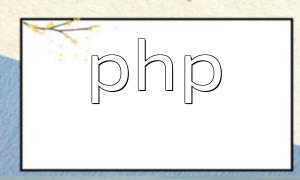With the release of PHP7, developers gained the ability to declare data types for function parameters and return values. This reduces the need for manual input validation, makes the code easier to read, and enables early error detection during compilation.
Before PHP7, developers had to manually validate parameter types within function bodies. PHP7 simplifies this with explicit type declarations in function signatures. Here's an example:
function calculateTotal(int $price, int $quantity): int {
return $price * $quantity;
}
$total = calculateTotal(10, 5);
echo "Total: $total";
In the above code, both $price and $quantity are declared as integers. If the function receives parameters of an incorrect type, a type error will be triggered. This improves clarity and reduces redundant checks.
PHP7 also supports return type declarations. This makes the intended output of a function explicit, improving readability and reducing potential bugs. Here's an example:
function isEven(int $number): bool {
return $number % 2 == 0;
}
$result = isEven(6);
if ($result) {
echo "The number is even";
} else {
echo "The number is odd";
}
By declaring the return type as bool, it becomes immediately clear that this function is expected to return a boolean value, aiding in proper usage.
PHP7 allows the use of a question mark (?) before a type to indicate it can also be null. This is especially useful when dealing with uncertain data, such as optional database results:
function getUser(string $username): ?array {
// Query the database; return null if user is not found
$user = getUserFromDatabase($username);
return $user ?: null;
}
$user = getUser("john");
if ($user) {
echo "Username: {$user['username']}";
} else {
echo "User not found";
}
Nullable types make it clear when a function might return null, allowing the calling code to handle such cases appropriately.
PHP7's type declarations significantly enhance code readability and reduce runtime errors. By clearly defining parameter and return value types, developers can write more maintainable, self-documenting, and reliable code. Whether for small utility functions or large-scale applications, adopting type declarations is a best practice in modern PHP development.








